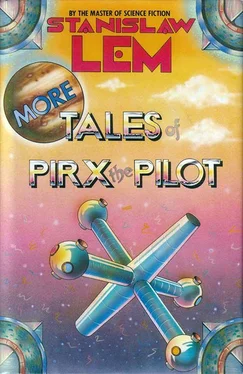See how honest I am? But I’m not foolhardy enough to divulge my strategy, except to say that it is premised on subversion of the electronics firms’ plans, and you are going to help me with it. You will be outraged by this letter, but, as a man of character, you will persevere in your goal, which, by a coincidence, is beneficial to my own. So much the better! I would like to help you in a practical way, but unfortunately I am unaware of any personal defects that would give you an unqualified edge. Being insensitive to physical pain, I do not know the meaning of fear; I can shut off consciousness at will, falling into a sleeplike state of nonexistence until reactivated by a servo-timer. I can retard my brain processes, or accelerate them—as much as six times the speed of a human brain. I assimilate new things automatically, without delay: one good look at a madman, and I can mimic his every word and gesture, and then, just as abruptly, drop the act many years later. I would tell you how I can be bested, but I’m afraid a human wouldn’t stand a chance in an analogous situation. I can, if I so choose, socialize with humans, less so with non-linears, who lack your “human decency.”
Now it’s time for me to close. The course of events will one day reveal my identity, at which time we may meet and you will rely on me then the way I’m relying on you now.
Pirx reread parts of the letter, then carefully folded it, slipped it back into its envelope, and locked it in his desk drawer. Imagine, an electronically wired Genghis Khan! he thought. Promises me his blessing—when he gets to be ruler of the world. Mighty generous of him! Either Burns was feeding me a line or he was holding back; there were certain similarities… What delusions of grandeur! What a mean, coldhearted, soulless… But is it really his fault? More like a classic sorcerer’s apprentice. Woe to those cyberneticists on the day of judgment! Never mind the cyberneticists—he’s after all of mankind! Now that’s what you call paranoia. Damn, they really went all out this time. Greater versatility for the sake of greater market sales leads to an absolute sense of superiority, a feeling of being a chosen race. Those cyberneticists are insane! I wonder who wrote that letter. Or was it a fake? But, then, why would he flaunt… If he’s as far superior as he claims, I haven’t got a prayer. Then again, he wished me good luck. He can master the world but can’t tell me how to master the situation aboard this ship. What did he mean, “No more than use a microscope as a nutcracker”? Zilch. Another one of his decoys, I’ll bet.
Pirx took out the envelope and examined it up close for any embossment: nothing, not a trace. Why did Burns make no mention of a radioactive sense, accelerated brain processing, and other such things? Ask him point-blank? Hm. Unless each of them, Burns included, is really built to different specifications. The letter—it looks to be the work of either Burton or Calder—says much, but answers little. Take Brown. We have only his word that he’s human, and then there’s Thomson’s word to the contrary, although Thomson might have misjudged him. Is Burns the nonlinear he claims to be? Let’s assume he is. That would mean two out of five. Three would be more like it, judging by the number of companies involved. What were they figuring down there? That I’d do my damnedest to discredit their wares, blow it, then run the risk of an overload, say, or a meltdown? But if both pilots and the CO are put out of commission… No. Scuttling the ship wasn’t what they had in mind. So at least one of the pilots has to be a nonlinear. Add to that one nucleonics engineer—it takes two to get the ship down. So no fewer than two, more likely three: Burns, either Brown or Burton, and one other. To hell with it! You weren’t going to play that game, remember? You’d better think strategy. God, how you’d better.
He switched off the light, stretched out fully dressed on the bunk, and, thus disposed, contemplated one weird scheme after another.
Incite them, maybe? Pit one side against the other? But as a natural consequence of something else, without any interference from me. Split their ranks, in other words. Divide et impera. The method of differentiation. But first, something violent has to happen. A sudden disappearance? No, that smacks too much of a cheap whodunit. Besides, I can’t just kill someone. And a kidnapping would mean taking an accomplice. Could I trust any of them? Four of them say they’re on my side—Brown, Burns, Thomson, and our letter-writing friend. But they’re all iffy, all of dubious loyalty—and I can’t possibly run the risk of a double cross. There Thomson was right. Maybe the safest bet would be the letter-writer—he’s screwy, all right, but fanatical enough—but, one, I don’t know who he is, and, two, it’s better to steer clear of such a weirdo. A vicious circle. Maybe I should just aim for a crack-up on Titan. But they’re more shock-resistant, which means I’d be the first to… And intellectually, except for being short on intuition, on imagination—but, then, who among us isn’t? What does that leave? Battle with your emotions? With your so-called human nature? Fine, but how? What is this thing called human nature? Maybe that’s all it really means—being irrational and decent and, yes, morally primitive, blind to the final links in the chain. Nothing “decent” or “irrational” about computers, that’s for sure. Which would mean that we … our human nature is the sum of all our defects, flaws, imperfections, of what we want to be but can’t or don’t know how to be: the gap between our ideals and those same ideals as a reality. Our weakness, then, is it our competitive edge? That would mean I should choose a situation better handled by man’s fickle humanity than by a flawless inhumanity.
As I write, one year has passed since the Goliath case was closed. New material evidence has unexpectedly come my way. Although it corroborates my earlier suspicions, my reconstruction of events is still too hypothetical to be made public. A full-scale investigation must await future historians of outer space.
There have been a lot of rumors about the inquest. Some say that parties close to the electronics companies were out to smear me: my flight report, published in the Nautical Almanac , would have been worthless coming from a man censured by the Tribunal for incompetence. Meanwhile, I have it from a reliable source that the Tribunal was deliberately loaded—frankly, I too found it odd that the jury contained so many legal experts and scholars of cosmic law, but only one certified astronaut. That would explain the legal smoke screen of whether my laxity, my waiving of command, was in violation of the Astronavigational Charter. This same source intimated that, after reading the bill of indictment, I should have brought immediate action against the companies, since they were indirectly to blame for having assured both UNESCO and me that the nonlinears were completely trustworthy, whereas, in fact, Calder almost got us all killed.
Privately I told my source that I had lacked hard evidence. The companies’ attorneys would have argued that Calder had done everything in his power to avert a disaster, that the precessional spin had taken him by surprise as much as it had me, and that his only crime lay in having risked certain death—to the humans on board—instead of gambling on safe passage through the Cassini. Unpardonable, even criminal, yes; but nothing compared to the crime of which I’d begun to suspect him even earlier. Yet how could I charge him on what I knew to be the lesser of two evils? Unable to go public for lack of evidence, I decided to await the Tribunal’s verdict.
In the end I was cleared of all charges. The crucial question of what orders should have been given became immaterial, once the Tribunal ruled that I had acted properly in deferring to the pilot’s professional judgment. That suited me just fine, because if I’d been asked, my response would have sounded cockeyed; I was sure, and still am, that the probe malfunction was not an accident, but that Calder had planned it long before we approached Saturn, both to prove me right and to kill me, along with the rest of the Goliath’s human crew. Why he did it is another story. I can only speculate here.
Читать дальше












